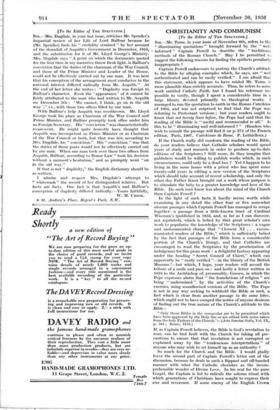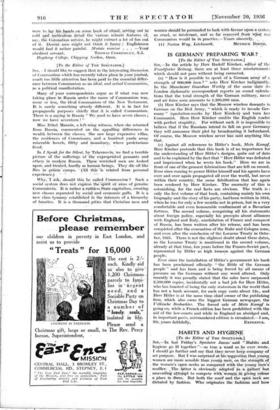CHRISTIANITY AND COMMUNISM
[To the Editor of THE SPECTATOR.]
Sur,—Mr. Toms, in your issue of November 6th, refers to the " illuminating quotations " brought forward by the " well- informed " Captain Powell to describe the " traditional methods of the Roman Church." May I be permitted to suggest the following reasons for finding the epithets peculiarly inappropriate ?
Captain Powell endeavours to portray the Church's attitude to the Bible by alleging examples which, he says, are " well
authenticated and can be easily verified." I am afraid that this statement, which appears to have misled Mr. Toms, is more plausible than strictly accurate. Thus, he refers to some work entitled Catholic Faith, but I found his reference im- possible to verify, though I spent a considerable time in a large library devoted primarily to theological works. I managed to run the quotation to earth in the Roman Catechism of 1904, and was not surprised to find that the Pope was referring to Protestant versions ; but your readers ought to know that not twenty lines before, the Pope had said that the reading of the Bible is " useful and recommended to all." Is this to be " illuminating and well-informed ? " (Readers who wish to consult the passage will find it on p. 271 of the French edition. Paris, 1907. Catichisme de Rome. P. Lethielleux.)
If the Church really did condemn the reading of the Bible, do your readers believe that Catholic scholars would spend years of study and research in order to produce up-to-date editions of the Scriptures ? Still more, do they imagine that
publishers would be willing to publish works which, in such circumstances, could only be a dead loss ? Yet I happen to be living in the same house with a priest who has spent some twenty-odd years in editing a new version- of the Scriptures which should take account of recent scholarship, and only the other day. Father Knox brought out a work whose purpose is to stimulate the laity to a greater knowledge and love of the Bible. Do such men know less about the mind of the Church
than Captain Powell ?
In the light of such facts it hardly: seems worth while examining in any detail the • other four or five somewhat obscure passages which Captain Powell has managed to scrape together—a passage from a little-known tract of Cardinal Wiseman's (published in 1853, and, as far as I can discover, not reprinted), which is belied by that great scholar's own work to popularise the knowledge of the Scriptures : a vague and undocumented charge that " Clement XI . . . excom- municated readers of the Bible," which is sufficiently belied by the fact that passages of the Bible form a considerable portion of the Church's liturgy, and that Catholics are encouraged to read the Scriptures by the proclamation of indulgences for this pious work : a delightful fantasy appearing
under the heading " Secret Council of Chieri," whidh can apparently be " easily verified "—in the library of the British Museum 1—but which,, I hope, your readers will accord the tribute of a smile and pass on : and lastly a letter written in 1816 to the Archbishop of, presumably,- Gnesen, in which the Pope expresses alarm that " the foundations of religion " are being " undermined ", by the activities of the Church's enemies, using unauthorised versions of the Bible. The Pope is not in any way seeking to withhold the Bible as such, a fact which is clear from another passage in the same letter, which ought not to have escaped the notice- of anyone desirous of finding out the true nature of the Church's attitude to the Bible : " Only those Bibles in the vernacular are to be permitted which have been approved by the Holy See or are edited with notes taken from the holy Fathers of the. Church."— (Acts Sanetae Sedis, Vol. IX, p. 581; Rome, 1876.)
If, as Captain Powell believes, the Bible is God's revelation to man, can he find fault with the Church for taking all pre- cautions to ensure that that revelation is not corrupted or explained away by the " tendencious interpretations " of anyone who may wish to set himself up as an authority ? So much for the Church and the Bible. I would gladly leave the second part of Captain Powell's letter out of the discussion, because he deals in such a flippant and off-handed manner with what the Catholic cherishes as the incom- prehensible wonder of Divine Love. In his zeal for the pure
Gospel, -the Captain is led to ridicule the solemn ritual with which generations of Christians have sought to express their awe and reverence. If some enemy of the English Crown were. to,.lay his hands on some book. of-ritual,' setting out hi cold and meticulous detail the various minute features of, say, the Cnicithation service, he _might extract a lot of fun out of it Decent 'Men might not think it funny: Englishmen would had it rather painful. Minato nomine . . —Your





























































 Previous page
Previous page